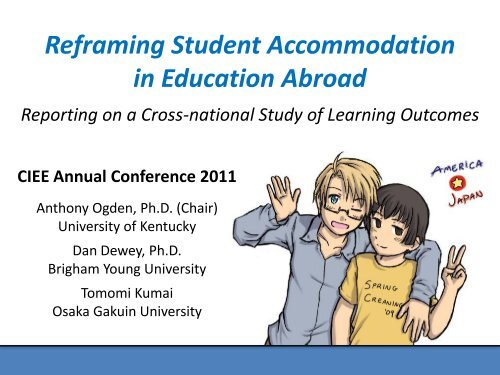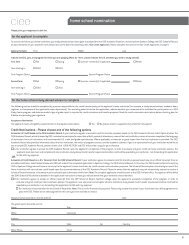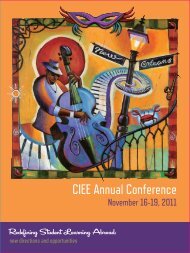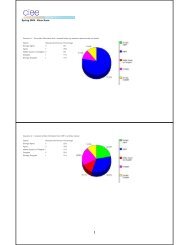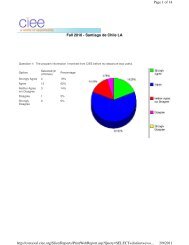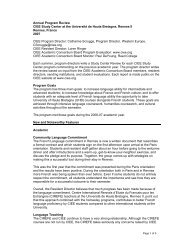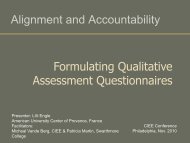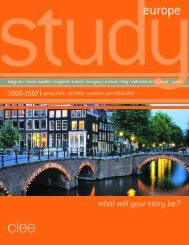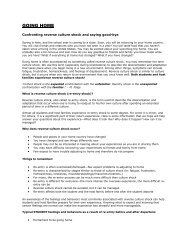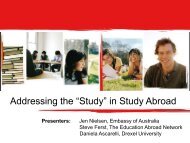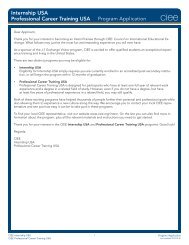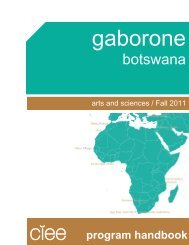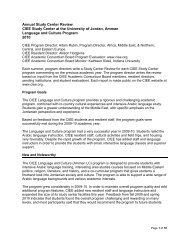Global Citizenship
Global Citizenship
Global Citizenship
You also want an ePaper? Increase the reach of your titles
YUMPU automatically turns print PDFs into web optimized ePapers that Google loves.
Reframing Student Accommodation<br />
in Education Abroad<br />
Reporting on a Cross-national Study of Learning Outcomes<br />
CIEE Annual Conference 2011<br />
Anthony Ogden, Ph.D. (Chair)<br />
University of Kentucky<br />
Dan Dewey, Ph.D.<br />
Brigham Young University<br />
Tomomi Kumai<br />
Osaka Gakuin University
Introductions & Presentation Overview<br />
セッション 概 要<br />
• Literature : What do we know about student housing?<br />
• Introduction to study & Methodology<br />
• <strong>Global</strong> <strong>Citizenship</strong> Scale<br />
• Findings: Quantitative & Qualitative<br />
• Discussion & Implications of findings<br />
• Study limitations & Future research<br />
• Q&A, Discussion
So, what does the literature say?<br />
先 行 研 究<br />
Student housing has long been considered an essential component<br />
in the education abroad experience, but it is one of the least<br />
examined areas of outcomes assessment research.<br />
Much of the existing research focuses on homestays and there is<br />
little on other housing types.<br />
Many claim that homestays are the “best” housing type, but there is<br />
little evidence on why students should (or should not) choose to live<br />
with a host family.<br />
Too often student accommodation is facilitated as<br />
a minor component of a program with little<br />
on-going support for the learning of both<br />
students and hosts.<br />
both
So, what does the literature say?<br />
先 行 研 究<br />
Homestays & Dormitories<br />
•Students engage more linguistically in the homestay than in the<br />
classroom (Iino, 2006).<br />
•A family setting is more beneficial than an apartment setting because<br />
it creates more opportunities to negotiate for meaning (Mancheno,<br />
2008).<br />
•Increases in emotional involvement with a different culture, altruism<br />
and idealism (Hansel, 1986).<br />
•Students were less like to gain in speaking and<br />
listening in the homestay than in the dormitory,<br />
more likely to gain in reading (Rivers, 1998).<br />
but
So, what does the literature say?<br />
先 行 研 究<br />
Roommates<br />
•Language learners develop more when paired with those more proficient<br />
than themselves (Mancheno, 2008).<br />
•Living with someone of another culture decreased prejudice (Laar & Levin,<br />
2003).<br />
•Participants in interracial rooms reported less satisfaction and<br />
involvement with their roommate than did participants in same-race<br />
rooms (Shook & Fazio, 2008).<br />
•No differences in roommate rapport and understanding between int’l/US<br />
and US/US pairs (Saidla & Parodi, 1991).<br />
•Living with international students does not promote<br />
higher<br />
levels of cultural activity among US college<br />
students<br />
(Minson, 2000).
So, what does the literature say?<br />
先 行 研 究<br />
Intervening in Student Learning<br />
•Participants in a peer program showed higher social adjustment scores<br />
than non-participants (Abe, Talbot & Geelhoed, 1998).<br />
•Support from interpersonal networks in the host country is negatively<br />
related to social difficulty (Ye, 2006).<br />
•The absence of an on-site director impacts the nature of cultural<br />
immersion (Wilkinson, 1998).<br />
•In order for immersion to result in an increased understanding of the<br />
host culture, students need “decisive intervention”<br />
(Laubscher, 1994).<br />
•Housing requires more complex interventions than<br />
simple design changes (Vande Berg, Connor-Linton,<br />
2009)<br />
& Paige,
So, what does the literature say?<br />
先 行 研 究<br />
The Georgetown Consortium Project<br />
(Vande Berg, Connor-Linton, & Paige, 2009)<br />
No correlation between types of housing and oral proficiency gains.<br />
Students who spent more time with members of their host families<br />
showed significant gains in oral proficiency and intercultural learning.<br />
Students who lived with students from the host country showed gains<br />
in their intercultural learning.<br />
Students who spent the least amount of time with US nationals made<br />
the greatest gains in intercultural learning.<br />
Students who spent 26-50% of their time with<br />
host nationals made the most progress in the<br />
intercultural learning.
Introduction to Study & Methodology<br />
研 究 紹 介 と 方 法 論<br />
• Program overview: Structure, Objectives, On-going<br />
orientation, Learning contract<br />
• Study methodology & framework<br />
• <strong>Global</strong> <strong>Citizenship</strong> Scale (Morais & Ogden, 2010)<br />
Special thanks to CET Academic Programs.
Program Overview: Program Structure<br />
プログラム 概 要 :プログラムの 構 成<br />
• 8-week, summer, Japan-based, hybrid program<br />
• Intensive Japanese language (180 contact hours)<br />
• Japanese-only language pledge<br />
• J-Chat Lounge & Weekly J-Chat events, company visits,<br />
volunteer, community service, etc.<br />
• 生 活 シェア: 1:1 in local apartments with<br />
US/Japanese pairs.
Program Overview: Program Objectives<br />
プログラム 概 要 :プログラムの 目 的<br />
• Maximize intercultural living experiences for cultural<br />
exploration and self-discovery<br />
文 化 理 解 と 自 己 発 見 のために、 異 文 化 間 の 生 活 経 験 を 最 大 限 させる。<br />
• Develop skills to enhance effectiveness at negotiating<br />
intercultural encounters<br />
異 文 化 経 験 を 理 解 する 際 の 効 率 性 を 高 める。<br />
• Understand the relationship of language and communication<br />
styles to basic cultural values<br />
言 語 とコミュニケーションスタイルが、いかに 基 本 的 な 異 文 化 での 価<br />
値 観 に 影 響 を 及 ぼすのかを 理 解 する。<br />
• Appreciate cultural differences in approaches to conflict<br />
resolution<br />
文 化 間 で 起 こりえる 誤 解 等 に 対 する 解 決 アプローチの 違 いを 理 解 する。
Program Overview: On-Going Orientation<br />
プログラム 概 要 : 継 続 的 オリエンテーション<br />
CET Students<br />
OGU Students<br />
• Welcome orientation<br />
• Career integration workshop<br />
• Pre-reentry training<br />
• Intercultural conflict resol.<br />
[Contrast Culture]<br />
• Pre-arrival orientation<br />
• Post-program orientation<br />
• Intercultural communication workshop [HC/LC com.]<br />
• Cultural adjustment workshop [Barnga]<br />
• Intercultural value dimensions [Flashcards, debriefing]
Program Overview: Learning Contract<br />
プログラム 概 要 : 学 習 契 約 書<br />
Learning Goal/ 学 習 上 のゴール:<br />
何 を 学 習 したいか。<br />
Methods/ 方 法 :<br />
どのようにして 学 習 するか。<br />
Method of Evaluation/ 評 価 の 方 法 :<br />
どのように 学 習 したことを 示 すつもりか。<br />
1.<br />
2.<br />
3.<br />
4.<br />
5.<br />
Resources/リソース:<br />
あなたが 学 習 しなくてはならないこと。<br />
Completion Date/ 完 了 の 時 期 :<br />
いつまでに 学 習 を 完 了 するのか。
Methodology & Framework<br />
研 究 方 法 ・フレームワーク<br />
To what extent does student accommodation mediate changes in<br />
students’ global citizenship and thereby, social responsibility, global<br />
competence and global civic engagement, and how does change<br />
over time differ between visiting and host students?<br />
• Two-year (Summer 2010 & 2011), mixed-methodology<br />
• 生 活 シェア program participants<br />
• <strong>Global</strong> <strong>Citizenship</strong> Scale (Jpn. & Eng.), pre- &<br />
post-testing<br />
• Learning contract, on-going orientation,<br />
program evaluations
Methodology & Framework<br />
研 究 方 法 ・フレームワーク<br />
Self-Selection<br />
Education Abroad<br />
Experience<br />
Summer, 8-week<br />
Program (Japan)<br />
<strong>Global</strong> <strong>Citizenship</strong><br />
Social Responsibility<br />
<strong>Global</strong> Competence<br />
<strong>Global</strong> Civic Engagement<br />
<strong>Global</strong> Justice & Disparities<br />
Altruism & Empathy<br />
Glob. Interconnectedness & Pers. Resp.<br />
Self-Awareness<br />
Intercultural Communication<br />
<strong>Global</strong> Knowledge<br />
Involvement in Civic Organizations<br />
Political Voice<br />
Glocal Civic Action<br />
Moderating Variables<br />
On-Going Orientation Program
So, what is global citizenship?<br />
<strong>Global</strong> <strong>Citizenship</strong>とは?
So, what is global citizenship?<br />
<strong>Global</strong> <strong>Citizenship</strong>とは?<br />
• Social Responsibility. The perceived level of interdependence<br />
and social concern to others, to society, and to the environment.<br />
• <strong>Global</strong> Competence. Having an open mind while actively<br />
seeking to understand cultural norms and expectations of others,<br />
leveraging this knowledge to interact, communicate and work<br />
effectively outside one’s environment.<br />
• <strong>Global</strong> Civic Engagement. Demonstrated action and/or<br />
predisposition toward recognizing local, state, national and global<br />
community issues and responding through actions such as<br />
volunteerism, political activism and community participation.
So, what is global citizenship?<br />
<strong>Global</strong> <strong>Citizenship</strong>とは?<br />
Social<br />
Responsibility<br />
<strong>Global</strong><br />
Competence<br />
<strong>Global</strong> Civic<br />
Engagement<br />
?<br />
• The Coffee Shop Intellectual<br />
One can have a sense of social responsibility and the<br />
competence needed to effectively engage the world, but do<br />
little beyond merely discussing issues.
So, what is global citizenship?<br />
<strong>Global</strong> <strong>Citizenship</strong>とは?<br />
Social<br />
Responsibility<br />
<strong>Global</strong> Civic<br />
Engagement<br />
<strong>Global</strong><br />
Competence<br />
?<br />
• The Naïve Idealist<br />
One can have a sense of social responsibility and be fully<br />
engaged in local and global issues, yet lack the competency<br />
needed to engage effectively in the world.
So, what is global citizenship?<br />
<strong>Global</strong> <strong>Citizenship</strong>とは?<br />
<strong>Global</strong><br />
Competence<br />
<strong>Global</strong> Civic<br />
Engagement<br />
Social<br />
Responsibility<br />
?<br />
• The Imperialist<br />
One can have the competence to effectively engage in the world<br />
and be actively doing so, but lack a sense of social responsibility<br />
or genuine concern for others.
<strong>Global</strong> <strong>Citizenship</strong> Scale (Morais & Ogden, 2010)<br />
<strong>Global</strong> <strong>Citizenship</strong>の 尺 度<br />
Social<br />
Responsibility<br />
• <strong>Global</strong> Justice & Disparities<br />
• Altruism & Empathy<br />
• <strong>Global</strong> Interconnectedness & Personal Respon.<br />
<strong>Global</strong><br />
<strong>Citizenship</strong><br />
<strong>Global</strong><br />
Competence<br />
• Self-Awareness<br />
• Intercultural Communication<br />
• <strong>Global</strong> Knowledge<br />
<strong>Global</strong> Civic<br />
Engagement<br />
• Involvement in Civic Organizations<br />
• Political Voice<br />
• Glocal Civic Activism<br />
Scale: S-B Scaled χ 2 df CFI NNFI RMSEA SRMR<br />
<strong>Global</strong> <strong>Citizenship</strong> 707.79 394 .91 .90 .05 .06
What has the existing research shown?<br />
<strong>Global</strong> <strong>Citizenship</strong>とは?<br />
To what extent does participation<br />
in course-embedded education<br />
abroad programming mediate<br />
changes in global citizenship<br />
(Ogden, 2010)?<br />
*<br />
**<br />
*<br />
Embedded
Quantitative Findings: Demographics<br />
数 量 的 結 果 :<strong>Global</strong> <strong>Citizenship</strong>の 尺 度<br />
• Institution:<br />
• Gender:<br />
• Age:<br />
• Time Frame:<br />
30 OGU, 30 CET<br />
35 female, 25 male<br />
20.02 (SD=1.34)<br />
2010 (n=24), 2011 (n=36)<br />
• Standing: Freshman (7), Sophomore (16), Junior (27),<br />
Senior (8), Graduate (2)<br />
• Languages:<br />
1.03 OGU, 1.85 CET<br />
• Previous Travel: 2.6 OGU, 9.3 CET<br />
• Previous EA:<br />
15 OGU, 14 CET
Quantitative Findings: Sample<br />
数 量 的 結 果 :<strong>Global</strong> <strong>Citizenship</strong>の 尺 度<br />
Findings not statistically significant.
Quantitative Findings: Sample<br />
数 量 的 結 果 :<strong>Global</strong> <strong>Citizenship</strong>: Social<br />
Responsibility<br />
Findings not statistically significant.
Quantitative Findings: Sample<br />
数 量 的 結 果 :<strong>Global</strong> <strong>Citizenship</strong>: <strong>Global</strong><br />
Competence<br />
Findings not statistically significant.
Quantitative Findings: Sample<br />
数 量 的 結 果 :<strong>Global</strong> <strong>Citizenship</strong>: <strong>Global</strong> Civic<br />
Engagement<br />
Findings not statistically significant.
Quantitative Findings: Sample<br />
数 量 的 結 果 :<strong>Global</strong> <strong>Citizenship</strong>の 尺 度
Qualitative Findings: Learning Contracts<br />
質 的 結 果 : 学 習 契 約 書<br />
What does it means to be an interculturally competent person?<br />
What are the most important criteria or characteristics?<br />
CET Students<br />
OGU Students<br />
• Being respectful<br />
• Understanding<br />
• Accepting<br />
• Open-minded<br />
• Observing<br />
• Adapting<br />
Reported needing to observe,<br />
respect and understand.<br />
• Having one’s own opinion<br />
• Being able to speak up<br />
• Having intercultural<br />
experience<br />
• Being more active and<br />
assertive<br />
Reported needing to be more<br />
assertive to be global.
Qualitative Findings: Learning Contracts<br />
質 的 結 果 : 学 習 契 約 書<br />
CET Students<br />
• To improve language &<br />
conversation skills.<br />
• To learn about everyday<br />
life in Japan.<br />
• To learn about Japanese<br />
culture.<br />
• To develop friendships.<br />
• To better navigate in<br />
Japan.<br />
OGU Students<br />
• To learn about new<br />
cultures.<br />
• To develop new cooking<br />
skills.<br />
• To learn about the US.<br />
• To understand different<br />
lifestyles.<br />
• To enhance<br />
communication skills.
Qualitative Findings: On-Going Orientation<br />
質 的 結 果 : 進 行 中 のオリエンテーション
Qualitative Findings: Program Evaluations<br />
質 的 結 果 :プログラムの 評 価<br />
CET Students<br />
OGU Students<br />
• Were looking most forward to<br />
interacting with Jpn. people<br />
and using the language.<br />
• Were worried most about not<br />
getting along or having a<br />
roommate who is shy.<br />
• Learned most about social<br />
interaction, compromising<br />
and patience.<br />
• Most difficult was the lack of<br />
conversation.<br />
• Were looking most forward to<br />
interacting with international<br />
students.<br />
• Were worried most about<br />
different lifestyles, cultural<br />
differences and food.<br />
• Learned most about<br />
communication and difficulty<br />
of having a roommate.<br />
• Most difficult was logistics<br />
(cleaning, temp., etc.) & lang.
Discussion of Findings<br />
結 果 討 論<br />
To what extent does student accommodation mediate changes in<br />
students’ global citizenship and thereby, social responsibility, global<br />
competence and global civic engagement, and how does change<br />
over time differ between visiting and host students?<br />
• Students showed non-significant change over time in<br />
global citizenship.<br />
• There were significant differences in global citizenship<br />
between OGU and CET students.<br />
• Students were self-selected and thus, may<br />
have started at a very high level of global<br />
citizenship.
Discussion of Findings<br />
結 果 討 論<br />
• Definitions of intercultural competence and<br />
expectations differed between the two groups.<br />
• Learning contracts for the 生 活 シェア differed on<br />
language-learning vs. lifestyle oriented goals.<br />
• OGU and CET students were both concerned about<br />
social interaction.<br />
• Differences between students in global<br />
citizenship, expectations of the<br />
experience, etc. may be largely based on<br />
cultural norms and expectations.
Discussion of Findings<br />
結 果 討 論<br />
Is this an example of using the wrong assessment tool?<br />
• The goals of the 生 活 シェア program are more aligned with<br />
intercultural communication than with global citizenship.<br />
• Although a sub-dimension of the <strong>Global</strong> <strong>Citizenship</strong> Scale<br />
examines intercultural communication, it may not be<br />
focused enough to elucidate pre/post gains.<br />
• Gains in intercultural competence and<br />
language could be measured both objectively<br />
and by self-assessment.
Study Limitations & Future Research<br />
研 究 の 限 界 と 今 後 の 計 画<br />
Limitations<br />
• Low sample size<br />
• Testing, history,<br />
selectionmaturation<br />
• Lack of validation of<br />
Japanese scale<br />
version<br />
• Data miscoding<br />
error potential<br />
Future Research<br />
• Larger study comparing housing type<br />
• Utilization of control groups that allow<br />
comparison with those not<br />
participating in the housing program<br />
• Examine program duration<br />
comparisons (long-term vs. short-term)<br />
• Utilization of other measures (IDI, etc.)<br />
• Compare similar program types across<br />
other countries<br />
• Experiment with other interventions<br />
(i.e. on-going orientation)
Q&A, Discussion<br />
Q&Aと 討 論<br />
• What do these results mean for program development and<br />
implementation?<br />
• Simply living together may not be enough. How must we<br />
further intervene in the learning throughout the<br />
experience?<br />
• Is <strong>Global</strong> <strong>Citizenship</strong> an elite, western concept?
Reframing Student Accommodation<br />
in Education Abroad<br />
Reporting on a Cross-national Study of Learning Outcomes<br />
CIEE Annual Conference 2011<br />
Anthony Ogden, Ph.D.<br />
a.ogden@uky.edu<br />
Dan Dewey, Ph.D.<br />
ddewey@byu.edu<br />
Tomomi Kumai<br />
kumai@ogu.ac.jp


